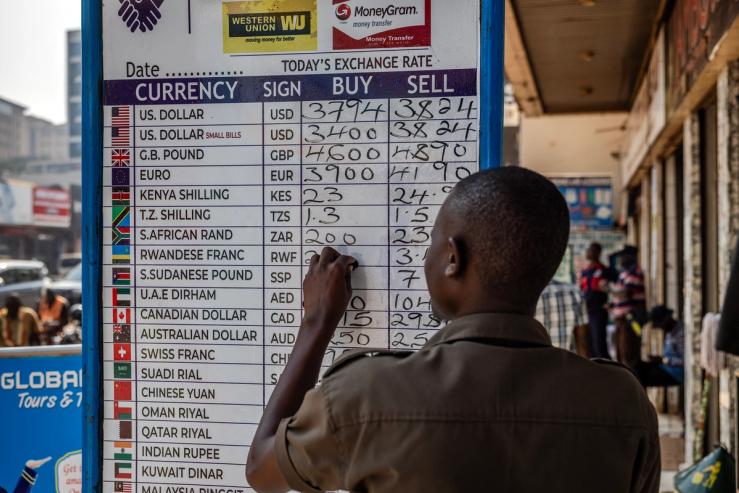The News
A payments company backed by African political leaders has launched a blockchain-based marketplace for trading local currencies, in a bid to make it easier for companies to repatriate their profits and reduce the continent’s dependence on the dollar in regional trade.
The Pan-African Payment and Settlement System (PAPSS), a company set up by the African Export-Import Bank (Afreximbank) and endorsed by the African Union in 2019, publicly launched the exchange this week after testing it in a year-long pilot program. PAPSS partnered with Interstellar, a Cameroon-headquartered blockchain infrastructure company, to create the exchange.
Demand for the marketplace comes from international companies that do business across Africa and struggle to move money, said PAPSS chief executive Mike Ogbalu III, who spoke to Semafor on the sidelines of Afreximbank’s annual meeting in Nigeria. The roughly 80 companies that trialled the service include multinational insurance companies who operate in multiple African countries and often can’t access foreign exchange to repatriate their earnings, Ogbalu told Semafor.
Interstellar’s CEO Ernest Mbenkum said the company plans to enable the buying and selling of regulated African currency stablecoins — like Nigeria’s cNGN — on the exchange in the near future.
Know More
Ogbalu said airlines are a key target of the marketplace, in the push to ease the process of repatriating earnings. An estimate by global airlines trade group IATA suggests more than $1 billion of their members’ revenues remains trapped or blocked in Africa.
The exchange is the newest feature PAPSS has produced to fulfill its broader mandate: to create a central instant payments platform that enables transactions that begin in one African currency and end in another. It currently completes these transactions in seven seconds on average, Ogbalu said.
After a formal endorsement by African heads of state in 2019, PAPSS launched local currency instant payments across English-speaking West Africa and Guinea four years ago. Since then it has expanded to 16 countries covering other regions including North Africa. Its products are intended to underpin the African Continental Free Trade Area’s (AfCFTA’s) agenda of boosting intra-Africa trade. A key goal for the agenda is to end the dollar’s role as the intermediary trade currency between the continent’s more than 40 currencies. But at the moment, nearly half of commercial payments going out of Africa are dollar transactions, according to the SWIFT payments network.
Step Back
The AfCFTA, Africa’s landmark agreement that created the world’s largest free trade area in 2018, is projected to unlock a $3.4 trillion market. The aim is to remove tariffs and other trade barriers to ease the movement of goods in a continent of around 1.5 billion inhabitants.
But intra-Africa trade accounted for “a paltry 14.4%” of Africa’s formal trade in 2024 despite a “robust” 12.4% year-on-year rise in transaction value to $220.3 billion, Afreximbank said in a trade report published this week. Reducing transaction costs incurred in major international currencies will help to improve trade within Africa, analysts say.
While PAPSS could lower trade and currency conversion costs in Africa by $5 billion, its utility stretches beyond savings, said the AfCFTA secretary-general Wamkele Mene.
“Trading in the United States dollar or any other currency has no business between African countries,” Mene told an audience at the Afreximbank meeting. “We must use our own currencies and ensure the economic sovereignty of our continent, guarding ourselves against the ever-shifting geopolitical tensions which have an impact on payments,” he said.
The View From African Banks
Previous attempts to improve the efficiency of cross-border payments for intra-Africa trade have stumbled due to the absence of political will, said Kenneth Ugwuanyi, head of transaction banking at the United Bank for Africa Group which operates in 20 African countries. The backing of African leaders for PAPSS has given commercial banks a strong institutional basis to more easily carry out transactions within the continent, he said.
And the system appears to be benefitting the bottom line of banks adopting it. GCB Bank, Ghana’s largest lender by assets, saw both its cross-border trade transactions and small and medium-scale business client base grow last year by “about 25% and a significant portion of that was driven by PAPSS,” said George Fuachie, its head of investor relations.
Room for Disagreement
A marketplace for African currencies presents a chicken and egg problem because “you need more trade within Africa to boost demand for African currencies,” Amaka Anku, head of the Eurasia Group’s Africa practice, told Semafor.
It remains to be seen how the exchange operates when there is no demand to match the supply of the currencies of countries that don’t export much to other African countries, said Anku. “You can only have a market when there is supply to meet demand,” she said.
Notable
- Africa’s push for new payment channels for trade is driven by the fact that “the existing financial network that is largely dollar-based has essentially become less effective and costlier,” Syracuse University professor Daniel McDowell told Reuters.


